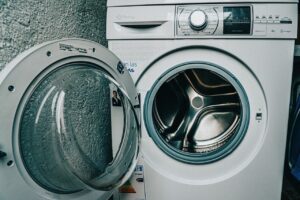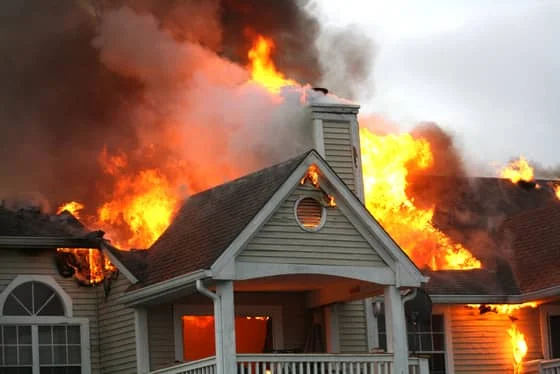In today’s dynamic society, washing machines play an essential role in preserving our routine activities. These devices consistently work to cleanse our garments of daily stains and soil, keeping our attire ready for any circumstance. However, in addition to the convenience they provide, washing machines carry certain dangers, with fire hazards being particularly significant. This raises the question: can a washing machine catch fire? Even though the odds of such occurrences are slim, the fallout can be devastating, underlining the necessity for homeowners to recognize and implement preventive strategies to avoid such calamities.
Understanding that washing machines, akin to any electrical appliance, require ongoing maintenance and supervision for safe use is imperative. But can a washing machine catch fire? The combination of water and electricity can pose risks if the machine is neglected. This guide serves to outline the common elements leading to washing machine fires, such as electrical issues, circuit overloads, and substandard wiring. It will also furnish essential guidance for enhancing safety and optimizing appliance performance. By being aware of these hazards and mastering their management, you can significantly improve your home’s safety and extend the durability of your washing machine.
Common Causes of Washing Machine Fires
Electrical Malfunctions and Faulty Wiring
 It is widely recognized that many washing machine fires initiate due to electrical issues. Compromised or wrongly installed wires can generate sparks that might ignite a fire. Such electrical problems can arise from age-related wear or incorrect installation practices. Regular inspections by an experienced electrician can help to identify and remedy these risks before they turn hazardous.
It is widely recognized that many washing machine fires initiate due to electrical issues. Compromised or wrongly installed wires can generate sparks that might ignite a fire. Such electrical problems can arise from age-related wear or incorrect installation practices. Regular inspections by an experienced electrician can help to identify and remedy these risks before they turn hazardous.
Overloading and Overheating
Loading your washing machine beyond its intended capacity can strain the motor and other essential components, leading to overheating. A machine that is too full must exert additional effort to agitate the clothes, which increases the risk of overheating. This situation could potentially result in a fire. To prevent this hazard, it is important to adhere to the manufacturer’s load size recommendations.
Poor Installation and Maintenance
Incorrect installation may result in stress concentrations and heightened wear on the machine’s components. This situation can give rise to leaks, potentially leading to short-circuits in electrical components. Furthermore, the absence of routine maintenance can allow minor issues to develop into significant complications. It is essential to have your machine installed by a qualified professional and to schedule regular maintenance inspections.
Flammable Materials Around the Machine
One prevalent error is the storage of flammable items near the washing machine, a practice that can result in serious outcomes. Materials such as cleaning products, gasoline, or even a collection of laundry are susceptible to ignition if the machine overheats or produces sparks. Ensuring that the vicinity is kept clear and orderly can significantly lessen this danger.
Safety Tips for Preventing Washing Machine Fires
Regular Inspection and Servicing
Conducting routine inspections is essential for fire safety. It is important to look for worn cords, loose connections, and any visible signs of damage. Arrange for periodic servicing to verify that all elements are functioning as intended. A qualified service provider can uncover potential dangers that may escape the notice of an untrained observer.
Using Recommended Detergent and Quantity
Employing the wrong type or an excessive quantity of detergent can produce residues that result in pipe obstructions and impose strain on the machine, leading to potential malfunctions. To circumvent this issue, one should always opt for the detergent recommended by the manufacturer and strictly follow the suggested usage quantities.
Avoid Overloading the Machine
Overloading a washing machine places significant stress on the motor and other integral parts, which can trigger overheating issues. When the appliance is overly packed, it must work harder to agitate the garments, consequently increasing the potential for overheating. This condition may pose a fire threat. It is crucial to comply with the manufacturer’s recommended load sizes to avoid such dangers.
Keep the Area Clutter-Free
Ensuring a tidy space around your washing machine is essential for fire prevention. It is important to remove any combustible items and to allow enough room for airflow. Implementing this easy measure can greatly diminish the likelihood of a fire occurring.
Washing Machine Maintenance for Enhanced Safety
Routine Maintenance Procedures
Ensuring the safe and efficient performance of your washing machine relies heavily on effective maintenance. Routine inspections of the hoses for any cracks or leaks are necessary, along with confirming that all connections are secure. Even if hoses appear undamaged, replacing them every five years is recommended to avert unexpected failures or leaks.
Regular Lint Filter Cleaning
Lint accumulation within your washing machine represents a noteworthy fire danger that is commonly underestimated. Regular cleaning of the lint filter can effectively prevent the ignition of excess lint in cases of overheating. This uncomplicated maintenance task is critical in reducing the potential for fire incidents.
Scheduling Professional Servicing
Arranging for annual professional maintenance can assist in detecting and addressing potential problems before they worsen. Experts can conduct a comprehensive inspection and suggest essential updates or repairs. Additionally, it may be beneficial to upgrade to a contemporary washing machine model that includes advanced safety features, as these offer enhanced protection compared to older models. Consistent updates guarantee that your appliance remains safe and aligned with the latest technological advancements.
What to Do in Case of a Washing Machine Fire
Step-by-Step Guide
If a fire breaks out, maintaining composure and acting without delay is crucial. The first step is to safely unplug the equipment if possible. Test a fire extinguisher on small blazes; however, should the fire grow beyond your control, evacuate without hesitation. Call emergency services to manage the crisis competently.
Importance of a Fire Extinguisher
Keeping a fire extinguisher readily available can be vital for safety. It is important to ensure that it is within easy access and that one is knowledgeable about its usage. Furthermore, regular maintenance checks should be performed to verify its operational status, as an inoperative extinguisher will not serve its purpose during a crisis.
When to Evacuate and Call for Help
If a fire seems beyond control, prioritize your safety. Evacuate the premises and call for help immediately. Firefighters are trained to handle such situations safely and effectively.
Conclusion
Despite their rarity, washing machine fires constitute a real danger that warrants the attention and proactive measures of every homeowner. One might wonder, can a washing machine catch fire? Gaining an understanding of the primary factors that contribute to these fires and adhering to effective prevention practices can significantly lower the risk. Conducting routine maintenance and remaining alert to potential warning signs are essential for maintaining a safe household.
Maintaining vigilance and ensuring your washing machine is in optimal condition is vital for safety and peace of mind. Always prioritize routine checks and professional servicing for your appliance to function safely and efficiently. By staying informed and prepared, you can avoid challenging situations, such as selling a fire-damaged house, and enjoy a safer home free from the worries of preventable fire hazards. Consulting home safety resources or professionals who specialize in appliance maintenance further supports this proactive approach.

